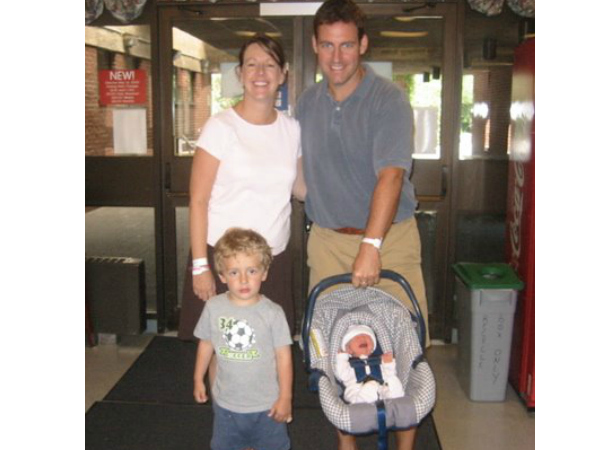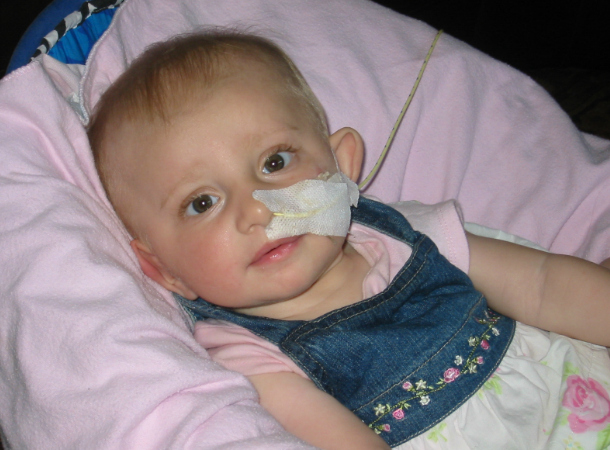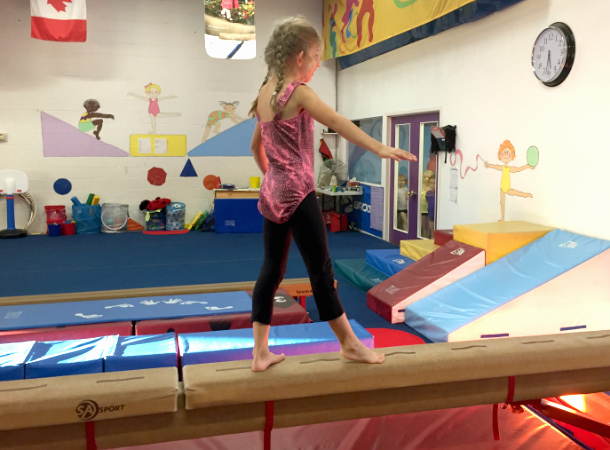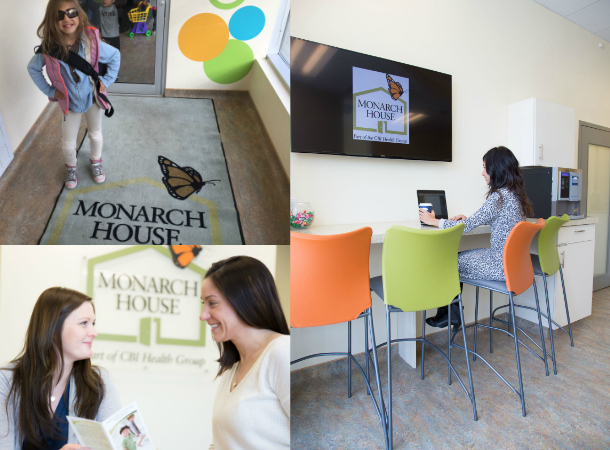
Despite the doctors who told us there was nothing wrong, we knew. Parents always know. We feel it in our gut. Mother’s instinct—it’s real and it’s powerful.
Though her birth was remarkably unremarkable, when she was a few months old, we started having concerns. Our already tiny baby girl was losing weight and the milestones that mark healthy development were never achieved.

True fear kicked in when our daughter stopped feeding. We were losing her and we fought to make doctors listen. By the time they did, our baby was in full “failure to thrive” mode.
It was at this time, when Avery was eight months old and living full-time in the hospital, that we got a diagnosis. We heard the words, “Chromosomal Translocation Disorder” and “Rare Syndrome” and “We are so sorry.”
We fed her through a nasal gastric tube and she began to gain weight. The colour came back to her cheeks and the sparkle returned to her eyes. With her health and growth on track, we turned our attention to her development. What would a disorder like this mean for our child? What would her future look like?
Every specialist we met with agreed—the loss of genetic material was catastrophic. By all accounts, it meant our child’s cognitive and physical development would be significantly affected. “She may never speak, so start signing with her as soon as possible. It's unlikely that she will be fully mobile without assistance. Also, nearly every documented case we’ve seen with a similar deletion is somewhere on the autism spectrum.”
Those words were like a kick to the stomach. I remember physically losing my breath.
But I also remember thinking, “No!! This can’t be right! That sparkle in her eye is so bright. She understands and she feels love. We’ll do everything we can to give her the best possible chance at a full and beautiful life.”

Avery was scheduled for gastric tube (G-Tube) insertion surgery just before her first birthday. She would be fed via a tube in her stomach for years to come. It was the right choice at the time. The nasal gastric tube was uncomfortable and difficult and not a long-term solution. But, she came down with a cold the day before the surgery and it was cancelled.
We continued using the nasal gastric tube, but also introduced some solids by mouth. There was no pressure. She got the bulk of her nutrition and hydration via the tube, so we played with food and let her go at her own pace.
When the date of the rescheduled surgery came, she had a fever and the surgery was cancelled once again.
In the meantime, we continued oral feeding and slowly but surely, she got the hang of it. I knew in my gut that she could do it. She just needed time. The more she fed, the stronger she got and the motor skills necessary to eat and drink by mouth improved. We thickened fluids to make them easier to manage. And we tried an anti-reflux medication that made a world of difference. We saw progress and felt hope for the first time in a long time.
At our next occupational therapy session, I told our Occupational Therapist that we decided to cancel the G-Tube surgery. I expected her to be as excited as we were. I wasn’t prepared for her harsh words. She told me I was wrong—that Avery would never feed well enough on her own and I was a negligent parent for cancelling the surgery.
I don’t remember what I said in response. I know I cried and mumbled something about knowing what is best for my child. We never went back to see her again. The trust between our family and that therapist was destroyed.
That’s the thing about therapists—physical, speech, occupational, and behavioural. They support us and hold our hands and teach us what to do and cheer the loudest when our kids achieve a goal. It’s vital to find a therapist you click with—somebody who celebrates with you and supports your child.
We found our support early on and I credit that early intervention for much of my daughter’s current success. I’m writing this post in the waiting room at her gymnastics class. Not only is she walking on her own without assistance, she’s walking across a narrow balance beam and climbing to the top of the rope and ringing the bell at the ceiling. And yes, I cry every damn time.

Avery’s physical therapist helped her learn to walk up and down stairs safely and suggested special knee high orthotics called AFOs that helped support her ankles when they were too weak to support her properly. She helped us wean her off those “magic boots” and she celebrated with us as we threw them away with great ceremony into the trash can.
My daughter's new occupational therapist taught her to fasten zippers and sit tall in her special chair and so many other important things. As Avery moves through school, we continue to rely on Occupational Therapist suggestions—they keep Avery safe, ease frustration, and help her function to the best of her ability.
In the early days, my daughter struggled to speak. She communicated in one syllable squawks and grunts and coos and some ASL hand signs. When she was around two, she had yet to speak a word. During a speech session with Sarah, Avery’s speech therapist, she spoke. Just one word and it was the sweetest sound I’d ever heard.
Sarah had her playing with toy that Avery loved—a ramp with a little red ball. Avery wanted the ball, so with the proper prompting she asked for it. “Baw.” She said ball.
And of course I cried. Pretty hard, actually. And you know what, Sarah cried too. Both of us had worked so hard to get to this point and we cried happy proud tears together. Imagine somebody caring enough about my child to feel so much?
Avery continues to struggle with speech. She has what is called a “profound speech delay.”
Now that she’s older, we no longer qualify for funded speech therapy. The speech and language support she receives at school is minimal, at best. So, we sought private therapy. It’s expensive, but it’s an investment in the most important thing in the world. Her.
I know her speech will improve if we do the work. Mother’s intuition hasn’t failed me yet.
Recently Avery and I visited our local Monarch House, an organization that improves access, coordinates treatment, and focuses on results for those with developmental delays and disabilities. We took a tour of the centre and Avery did not want to leave. In fact, she’s been asking to go back to “play” as soon as possible. Our minds were blown.



Monarch House works with individuals of all ages and abilities. They provide evidence-based treatment in the areas of speech, language, communication, motor skills, recreation, vocational skills, daily living skills, social skills, and overall learning.
Their services are delivered in the setting that is most convenient to the client – their home, community or one of their clinics. Their team of clinicians are all under one roof in order to provide easy and timely access to the professional that best meets your needs when you need the service.
One of their main focuses is parent education. This is key in my experience. Monarch House helps families understand developmental milestones, and teaches parents the steps to take if they have concerns.
When Avery was first diagnosed, we were totally lost. We knew we had to do something to help our daughter, but we didn’t know where to start. Having support early on and as your child's needs change and develop, is life changing. Literally.
Check out the Monarch House Parent Resource Handbook for information on identifying developmental delays/difficulties, and what to do next. There's also information on their website about wait times for programs and how to apply for funding.
Monarch House obviously supports parents of children with special needs, however parents of typically developing children can also benefit from many of the support services they provide. There's a variety of programming for children of all abilities. For example, the 'Homework Helpers Program' which is designed to help children with their usual school homework assignments. This is for any child who just needs a little extra help in understanding concepts or needs help learning how to focus and organize.
If you have concerns or just want to ask the experts a question, you can visit Monarch House online to search their website and their blog for answers or to book a visit to chat. Also, and this is great.. pop into to one of their many FREE workshops, info sessions, or developmental screenings. Whether you decide Monarch House is right for you or not, they can help point you in the right direction.
Raising a child can be tricky. Get the support you need. You're not alone.
